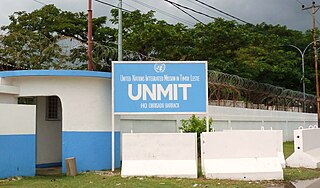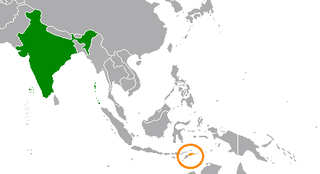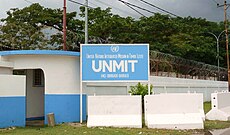
The Timor Leste Defence Force is the military of East Timor. The F-FDTL was established in February 2001 and comprises two infantry battalions, small naval and air components and several supporting units.

The United Nations Office in Timor-Leste (UNOTIL) supported the capacity development of critical state institutions, including the East Timor National Police (PNTL) in order to strengthen democratic governance and to help further build to peace in East Timor. A UN Police Force of Technical Advisers continues to provide the country's police, Policia Nacional de Timor-Leste (PNTL), with specialized training for rapid response and intervention units. The Technical Advisers are also responsible for providing training in specialized areas such as counter-terrorism, forensics, and transferring management skills to the national police in all districts of Timor-Leste.

The United Nations Integrated Mission in East Timor (UNMIT) was established on 25 August 2006 by UN Security Council Resolution 1704. Its objectives are "to support the Government in consolidating stability, enhancing a culture of democratic governance, and facilitating political dialogue among Timorese stakeholders, in their efforts to bring about a process of national reconciliation and to foster social cohesion". In its most recent resolution on UNMIT, the Council extended its mandate until 26 February 2012. UNMIT and ISF troops left the country at the end of 2012.
Operation Tower is the Australian Defence Force's (ADF) contribution to the United Nations Integrated Mission in East Timor (UNMIT).

Timor Leste, since its creation in 1999, has received aid from many different parts of the International Community to help stabilise this new country. Despite this international support, East Timor still has stability issues.

United Nations Security Council Resolution 1912, adopted unanimously on February 26, 2010, after reaffirming resolutions 1599 (2005), 1677 (2006), 1690 (2006), 1703 (2006), 1704 (2006), 1745 (2007), 1802 (2008) and 1867 (2009) in addition to noting a report by the Secretary-General Ban Ki-moon, the Council decided to extend the mandate of the United Nations Integrated Mission in Timor-Leste (UNMIT) in East Timor until February 26, 2011.

United Nations Security Council resolution 1410, adopted unanimously on 17 May 2002, after recalling previous resolutions on East Timor (Timor-Leste), particularly resolutions 1272 (1999), 1338 (2001) and 1392 (2002), the council established the United Nations Mission of Support to East Timor (UNMISET) to replace the United Nations Transitional Administration in East Timor (UNTAET).

United Nations Security Council resolution 1480, adopted unanimously on 19 May 2003, after reaffirming previous resolutions on East Timor (Timor-Leste), particularly resolutions 1410 (2002) and 1473 (2003), the council extended the mandate of the United Nations Mission of Support to East Timor (UNMISET) for a period of twelve months until 19 May 2004.

United Nations Security Council resolution 1543 was adopted unanimously on 14 May 2004, after reaffirming previous resolutions on East Timor (Timor-Leste), particularly resolutions 1410 (2002), 1473 (2003) and 1480 (2003). The Council extended the mandate of the United Nations Mission of Support to East Timor (UNMISET) for six months, with a view to extending it for a further final period of six months until 20 May 2005.

United Nations Security Council resolution 1573, adopted unanimously on 16 November 2004, after reaffirming previous resolutions on East Timor (Timor-Leste), particularly resolutions 1410 (2002), 1473 (2003), 1480 (2003) and 1543 (2004), the Council extended the mandate of the United Nations Mission of Support to East Timor (UNMISET) for a final six months until 20 May 2005.

United Nations Security Council resolution 1599, adopted unanimously on 28 April 2005, after reaffirming previous resolutions on East Timor (Timor-Leste), particularly resolutions 1543 (2004) and 1573 (2004), the council established the United Nations Office in Timor-Leste (UNOTIL) to follow on from the United Nations Mission of Support to East Timor (UNMISET) as a special political mission for one year until 20 May 2006.

United Nations Security Council Resolution 1677, adopted unanimously on May 12, 2006, after reaffirming previous resolutions on East Timor (Timor-Leste), particularly Resolution 1599 (2005), the Council renewed the mandate of the United Nations Office in Timor-Leste (UNOTIL) until June 20, 2006.

United Nations Security Council Resolution 1690, adopted unanimously on June 20, 2006, after reaffirming previous resolutions on East Timor (Timor-Leste), particularly resolutions 1599 (2005) and 1677 (2006), the Council renewed the mandate of the United Nations Office in Timor-Leste (UNOTIL) for two months until August 20, 2006.

United Nations Security Council Resolution 1704, adopted unanimously on August 25, 2006, after reaffirming previous resolutions on East Timor (Timor-Leste), particularly resolutions 1599 (2005), 1677 (2006), 1690 (2006) and 1703 (2006), the Council established the United Nations Integrated Mission in East Timor (UNMIT) for an initial period of six months.

East Timor is a multiparty parliamentary republic with a population of approximately 1.1 million, sharing the island of Timor with Indonesia's East Nusa Tenggara province. During the 24 years of Indonesian occupation and after the 1999 independence referendum, pro Indonesian militias committed many human rights violations. The country gained independence in 2002, and free and fair elections were held in 2007. The United Nations Integrated Mission in East Timor (UNMIT) and the International Stabilization Force remain in the country while it develops its own security forces, the National Police (PNTL) and Defence Forces (F-FDTL).
United Nations Security Council Resolution 1745 was unanimously adopted on 22 February 2007.

United Nations Security Council Resolution 1802 was unanimously adopted on 25 February 2008.
United Nations Security Council Resolution 1867 was unanimously adopted on 26 February 2009.

East Timor–India relations are the international relations that exist between East Timor and India. India maintains an embassy in Dili, while East Timor maintains an embassy in New Delhi. India previously announced on 7 September 2023 that it would open its embassy in Dili.

Isabel da Costa Ferreira, also Isabel Ruak Ferreira, was an East Timorese jurist, human rights activist, politician, and wife of East Timor's former president and former prime minister, Taur Matan Ruak. She was the First Lady of East Timor from 2012 to 2017. Along with her husband, she was a member of Partidu Libertasaun Popular (PLP).














